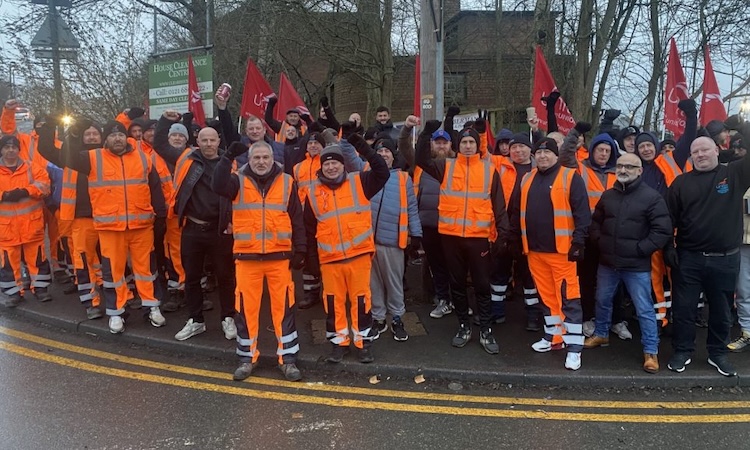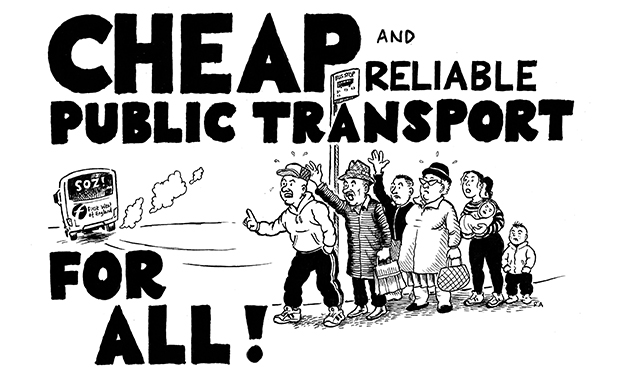Download this leaflet as a pdf.
Birmingham bin workers have been out on strike since 11 March. They are being told to take a pay cut of up to £8,000 after national austerity and local speculation combined to bankrupt the city. The council is refusing to back down, preferring to let 17,000 tons of refuse pile up uncollected in the streets. Rats are everywhere. The stink of rotting rubbish is unbearable.
Despite years of trying to balance the books via ever harsher cuts to public services, the council finally admitted defeat and issued a Section 114 notice in 2023, effectively declaring bankruptcy and banning all non-statutory spending. At the time, an £87 million deficit remained unresolved.
Commissioners, appointed by the Westminster machine to hack and slash the council’s already mangled budget, decided that one way of saving costs would be to downgrade essential refuse workers, thus reducing their pay – in some cases by £8,000 per year. This would be a hammer-blow to the affected workers in an ongoing and seemingly neverending cost of living crisis, and no one has yet explained why some of the community’s most hardworking and essential employees should bear the brunt of a crisis they had no hand in making.
Four reasons for the council’s bankruptcy:
• First and foremost are central government funding cuts going back decades.
• Second is the spiralling cost of services, despite huge cuts, which has resulted from steady privatisation. Outsourcing everything from school dinners to care of the elderly has led to a system where profiteers use ‘service provision’ contracts as an opportunity to rinse the taxpayer, delivering the minimum while charging the maximum.
• A £100 million cost overrun on a new IT system, one of many examples of profligate spending that benefits private corporations rather than city residents.
• A 2010 equal pay claim that has ended up costing the council £1.1 billion because they spent years fighting it in court.
The £100 million IT overrun happened because the council tried to customise a new system to pre-existing processes. Then-council leader John Cotton sought approval for extra funds, but only half was approved.
In 2010, a group of 4,000 women workers won an equal pay claim. They did all sorts of jobs, including cooking, cleaning and administration, but all had been left out of bonuses that were awarded to male employees, which meant that men on the same pay grade could be earning up to 60% more. At the time of their legal victory, solicitors estimated the cost of compensation at around £200 million. Instead of settling quickly, the council spent an estimated £1.1 billion over the next 14 years – a hefty chunk of it on legal fees to fight the ruling.
Just a Birmingham problem?
Birmingham city council is not alone in facing nightmarish holes in its finances. Councils up and down the country have been in a financial hole for decades, with eight going bust in three years. After 15 years of austerity, and with council tax rises capped at 5%, many more will inevitably follow.
Council finances have been driven head-first into a ditch because of the throttling of central government funding, which really began decades ago but was made much worse with the austerity drive launched by David Cameron’s coalition government in 2010. This austerity was a response to the huge bank bailouts instituted by Labour prime minister Gordon Brown during the financial crisis of 2008, at a total cost of over £1 trillion!
The money problems for many local authorities have been compounded because, encouraged by Westminster, councils have speculated considerable sums on high-risk ventures, including ‘not-for-profit’ energy companies, solar power farms and loan companies. Those responsible for investing council funds in these harebrained schemes often had little to no understanding of the likely risks or returns. And of course, having lined the pockets of assorted cronies and swindlers, they bear no personal liability for the consequent failures
Who pays the price?
As rubbish piles and rots in the streets, rats are running rampant while the lives of Birmingham’s working-class residents, already deeply affected by the cost of living crisis, are becoming even more difficult.
It is always working-class people who suffer the terrible consequences of central government-sponsored austerity and local council profligacy.
It is they who are deprived of the most basic services, paying higher and higher council tax bills and receiving less and less in return, even as they are also suffering the hammer blows of inflation in the cost of all essentials, from rent to food and energy.
What can we do?
The truth is that the financial crises and bailouts of 2008 and 2020, the wars in Ukraine and the middle east, and the huge austerity drive that has been inflicted on workers here in Britain are all symptoms of a deep economic crisis that is plaguing the global capitalist system. An immense blood price is being demanded from workers and oppressed peoples as the monopoly capitalists in whose interests this system operates try to bring back profitability to their failing order through ever greater pay cuts, every deeper austerity and ever more bloody and destructive wars.
This crisis cannot be fixed by voting, and none of the parties asking for our votes is even going to try. Whatever promises they make, they all serve the same bosses – the monopoly capitalist financiers. They are all parties of austerity and war.
For as long as this system remains in place, workers must organise themselves in self-defence, using their trade unions and mass organisations to demand measures to alleviate the cost of living crisis and ensure that it is not they who are forced to pay the price of a crisis that was not of their making. (See demands below.)
Under capitalist conditions, consultants are paid hundreds of pounds an hour to fix broken IT systems, endless billions are available for wars and bank bailouts, but no cash can be found for keeping our streets clean, or our schools and hospitals funded.
Ultimately, workers will only be successful in creating stable conditions in which their basic needs can be consistently satisfied by dropping all attempts to tinker at the edges of this crumbling and decaying system.
Bloodthirsty capitalist profiteering must be replaced by a planned socialist economy, in which production and service provision alike are based on the needs of the people; where all public services are free at the point of use, are fully funded, and are run by and for the working class.
Join us!
Urgent measures needed to address the crisis now:
- Nationalisation of ALL utilities (without compensation) along with monopoly producers, manufacturers and distributors of food, so as to ensure a secure supply of all necessaries at affordable prices, free from the vacillations and disruptions of the world market.
- Requisition and building of social housing and introduction of a rent cap to address the housing crisis.
- The complete renationalisation of every part of the NHS, including all its buildings and the pharmaceutical industry.
- Leaving Nato, bringing all troops and military contractors home, an end to funding for proxy forces and all other aspects of British involvement in aggressive wars abroad.
- Lifting the minimum wage to a level providing a decent family existence.
- Legislation for pay/benefit rises that keep pace with REAL inflation.
- An end to currency devaluation through endless money printing.
- An end to the self-defeating sanctions war against Russia, which is fuelling both the energy and the inflation crises.
- An end to all subsidies to banks and monopoly corporations. Any business considered ‘too big to fail’ or ‘necessary to the economy’ that cannot make adequate profit from ordinary operations should be nationalised without compensation and run according to a plan based on meeting the needs of the people.













